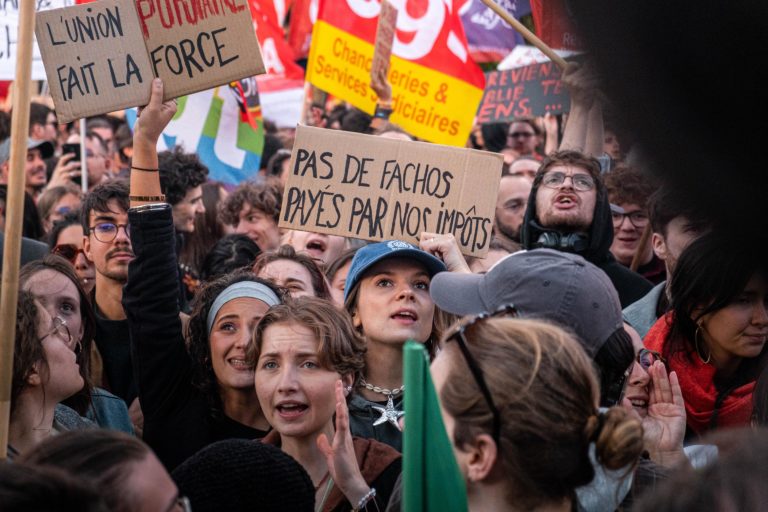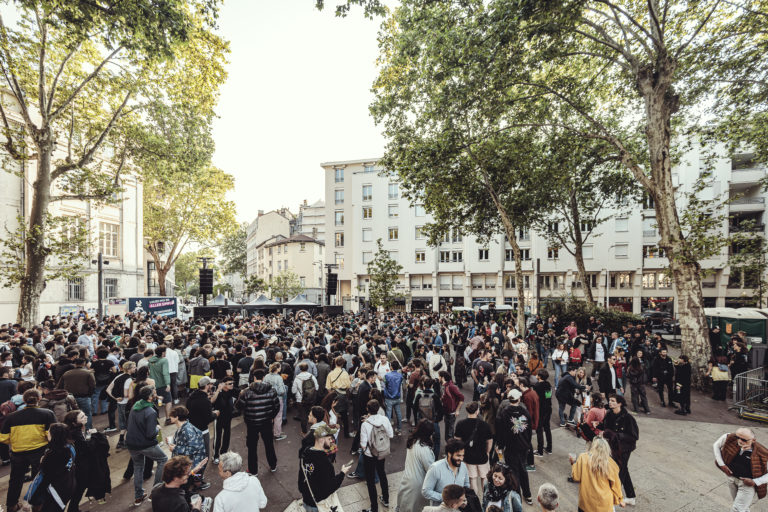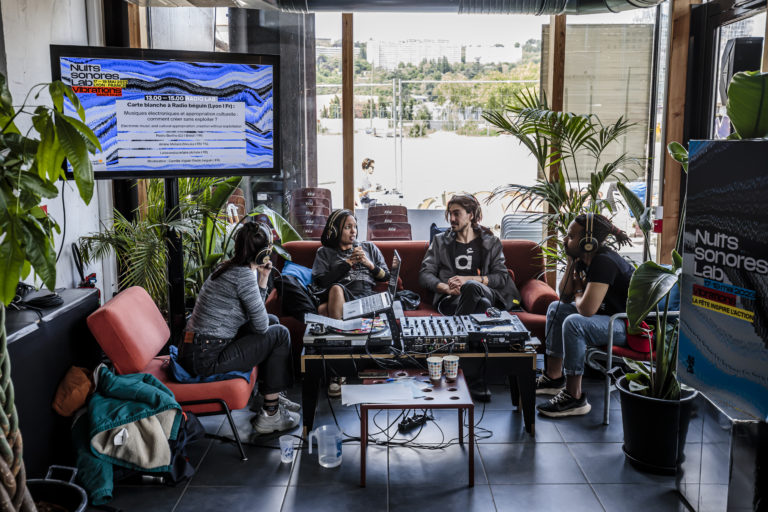Author: Manon Moulin
France stands at a critical juncture as the far-right surge propels the nation into a political crisis, threatening the independence of its culture and media. The European Parliament elections on June 9th, 2024, saw France leading in far-right representation, with Marine Le Pen's Rassemblement National securing 31.37% of the vote. In a dramatic turn, President Emmanuel Macron dissolved the French parliament, calling for snap elections on June 30th and July 7th. This move, set against a backdrop of rising far-right influence and shifting political alliances, has ignited fears of a potential far-right government and its implications for French democracy and cultural freedoms.

Demonstration at the Place de la République in Paris on June 10th, 2024 – © Aurèle Castellane (@broth_earth), Engrainage média
On June 9th, 2024, people across Europe were waiting for the results of the European Parliament elections. And we got them: A renewed Parliament, composed mainly of conservative and far-right MEPs–although the overall political balance hasn’t changed that much. This news was depressing enough, but France received two pieces of bad news in one evening. An hour after the results, President Emmanuel Macron announced in a televised address the dissolution of the French parliament and the organisation of snap elections three weeks later, on June 30th and July 7th.
European Elections’ Results: The Spark That Ignited the Fire
France is the country that will send the most far right MEPs to the European Parliament after these elections. After obtaining 31,37% of the votes (out of a 49% of abstention in the country), the Rassemblement National (RN, National Rally, France’s main far right party of Marine Le Pen) finished first, and will send 30 MEPs to the parliament. Adding 5 MEPs that will be sent by the other French far right party Reconquête (Reconquest, Éric Zemmour’s party), France has definitely chosen to put the far right on the first step of the podium.
One may wonder how, or why. The answer cannot be singular, nor easy. However, one thing is certain, even if many French were in shock, this doesn’t come as a total surprise. Indeed, the far right has been on the rise over the last decade–occupying both the media space, political debates, and ballot boxes, with 41.45% of the vote for Marine Le Pen in the 2022 presidential election. As in many other European countries, France has seen its political spectrum slowly shift to the right side, with most of the political representatives owning up the far right’s favourite topics and political rhetoric. Since his election in 2017, Emmanuel Macron and his group served as a springboard to Marine Le Pen and her protégé Jordan Bardella—both through speeches such as the ones of Interior Minister Gérald Darmanin, or laws like the immigration bill passed in January 2024.
In that sense, France has been a raging inferno in the last few years, one that only needed a spark to set the whole thing on fire. And this spark was switched by President Macron’s match: dissolving the French Parliament, justifying that the results of the European elections were demanding “a serious and weighty decision, but it is an act of trust. It's a time for essential clarification.” If the results of the European elections didn’t come as an actual surprise, this decision certainly did. Because not only has the President decided to dissolve the parliament after he was asked to do so by the RN, but he also decided that the snap elections were to be held three and four weeks later on June 30th and July 7th—an unprecedentedly short period of time for a political campaign.

Nuits sonores festival event in the public space, Place Guichard in Lyon, on May 8th, 2024 – © Gaétan Clément
Functioning and Political Forces: A Flying Campaign for Unprecedented Impact
This political campaign will be incredibly short. As political parties have had one week to form potential alliances and to define who will be invested in which constituencies, the campaign will actually last two weeks.
French legislative elections are based on a division of the country into constituencies—577 constituencies for 577 seats in the national parliament. Elections are held in two rounds in each of the 577 constituencies: the first reduces the number of candidates by eliminating those who didn’t win at least 12.5% of the vote, and the second elects the MP for five years. The political party or coalition which obtain the absolute majority (half of the seats + 1, meaning 289 seats) then gets to form a government, which will lead the country together with the current President (Macron). That is why these snap elections are particularly dangerous, as on July 7th, the French might end up with a far-right majority with the ability to form a government.
Since June 9th and the announcement of the dissolution of the parliament, political parties have been focused on creating alliances—necessary to secure as many seats as possible. In this framework, the general shift to the right of the political spectrum has been confirmed: The conservative party Les Républicains (The Republicans) has been shattered after its President Éric Ciotti announced he would rally the far right for this election, dividing his forces into pros and against. The Rassemblement National along with this fraction of the Republicans constitute one of the coalitions at play in the elections. On the other side of the spectrum, the left has chosen to create a large alliance, from the far left of the New Anticapitalist Party, to the Social Democrats of the French Socialist Party, including the Ecologists, the Communists, and La France Insoumise (France Unbowed), united under a banner entitled New Popular Front—a reference of the 1936 Popular Front left alliance, known for significant labour laws such as the introduction of paid annual leave for workers, or the right to strike. The last political force in these decisive elections is Macron’s political coalition Ensemble (Together) made up of centre right to right wing parties.
France now faces three scenarios: a victory for the Macron camp and continuity of government, or a cohabitation, which implies along Macron’s presidency, a government not belonging to the same political movement as Macron—on the left… or the far right.

Radio conversation between Pedro Bertho, Amine Metani, Laissonsluciefaire, and Camille Viguié during Nuits Sonores Lab, in Lyon, on May 19th, 2023 – © Brice Robert
Looming dangers: Disaster of a Far-right Power for Independent Culture and Media
As a French citizen, I feel like imagining the impossible. Thinking about having a far-right government is frightening, both as an individual and a cultural worker. France is already subject to the rise of political threats and violence from far-right groups, who are more and more empowered by the progress of the Rassemblement National. BIPOC[1] and LGBTQIA+[2] cultural events are regularly attacked by racist, transphobic, and homophobic far-right groups. Having a far-right government would catalyse this situation of violence, and give the State the possibility to actually limit the organisation of these events.
“The arts, essential for conveying ideas, provoking reflection, and celebrating human diversity, would be severely repressed. By substituting the word ‘culture’ with ‘heritage,’ the Rassemblement National reduces culture to a fixed, regressive, and nationalist vision,” explains Théo Majcher of independent theatre and media hub Alter Ego (X), and a member of the Reset! network. If not totally absent of the far right’s programmes, culture is used a tool of propaganda for their nationalist and racist ideology. It is then not about celebrating the richness of our diversity, but about praising the greatness of a fantasised past—that really never existed, the famous idiom ‘it was better before.’
A far-right government would also imply disastrous cuts in subsidies for independent culture. Indeed, any cultural activity that would go against the nationalist ideology would be rejected from public funding, putting at risk a significant number of cultural organisations. “Already, in cities governed by the Rassemblement National, cultural subsidies are drastically cut, and the freedom to address topics such as immigration or gender is stifled,” points out Théo Majcher. The independent cultural sector is already fragile due to a general lack of funding and mostly unstable business models, deeply affected by the Covid-19 pandemic, but such a political situation would increase this fragility and force independent cultural players into a survival mode. Examples are already existing in Europe, from Italy to Hungary, where rave are penalised, or LGBTQIA+ events are restricted, and where public funding are merely distributed to more classical structures that are considered legitimate.
Not only the cultural sector is under serious threat, but also the media sector. In France, the media sphere has been shattered in the last decades, favouring the far right. The growing economic and ownership concentration of French media—9 billionaires owning 95% of national media–is already worrying, and the political projects of these billionaires is even more. The emblematic case is the one of Vincent Bolloré, owner of French TV channel C8 and Canal+ group, several radio stations such as Europe 1, and written press like Le Journal du Dimanche, Paris Match, or Capital (and also of cultural venues, festivals, and Universal Music), whose media are being accused of sabotaging pluralism and of being propaganda channels. This private model of media is one that the far-right is dreaming of generalising. Marine Le Pen and Jordan Bardella, leaders of the RN, have clearly expressed their will to privatise public media, and repress independent media platforms. Some are already targeted by the RN; “A few years ago, they refused us access to their election evening and more recently they fired one of our journalists from the media pool who was following Marine Le Pen on her travels. If they come to power, they will no doubt try to attack us using the resources of the State. They can cut our subsidies, call into question certain approvals or trigger all kinds of control procedures,” explains Mathieu Molard, editor-in-chief at online media StreetPress. This would not only be a threat for freedom of expression, but also for a fair and plural access to information.
The rise of the far right in France “is a dangerous regression, threatening rights and freedoms we thought were secured. We are facing a cultural and democratic emergency,” as stated by Théo Majcher. Macron's decision is both a gamble and a denial of democracy. By choosing to give in to the demands of the far right, the French president has played his part in paving the way for the far right. By deciding to organise snap elections in three weeks, he has chosen to negate the importance of a structured and informative political campaign. A far-right government would be a direct and tangible threat to BIPOC, who are already victims of far-right racist physical and moral violence, to LGBTQIA+ people, whose very existence is being erased, and to independent cultural and media players who are trying to defend values of pluralism, acceptance, and solidarity. Since June 9th, protests have been organised every two days all over France to reaffirm that the country won't follow the path of some of its European neighbours and turn to the extreme right. Let's mobilise and hope that this call does not disappoint.
[1] Black and Indigenous People of Colour
[2] Lesbian, Gay, Bisexual, Trans, Queer, Intersex, Asexual +
References:
Lenaïg Bredoux, Macron dissout l’Assemblée après la victoire historique de l’extrême droite aux européennes (Macron dissolves the Assembly after the historic far-right victory in the European elections) – Mediapart
Mathieu Molard, Levons-nous contre l’extrême droite (Let's stand up against the far right) – Street Press
Matthieu Barreira, Cartographie : Le poids de six des plus importants opérateurs privés dans la chaîne de valeur des musiques actuelles en France (Map: The weight of six of the largest private operators in the French contemporary music value chain) – Nectart
Alexandra Schwartzbrod, CNews, chaîne de propagande en continu (CNews, the all-news propaganda channel) – Libération
Comment la TV Bolloré sabote le pluralisme (How Bolloré TV is sabotaging pluralism) – Acrimed
From political woes to economic ones: The first roaring week of France’s election campaign – Euractiv Podcast
Published on June 25th, 2024
About the author:
Manon Moulin is the editorial coordinator of all European projects for the non-profit organisation Arty Farty. She specifically works on the European network of independent cultural and media organisations Reset!, as well as the aggregation media We are Europe.